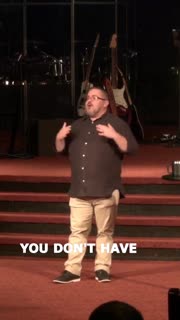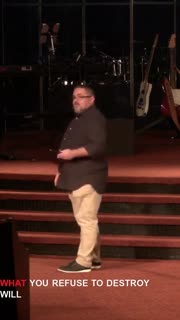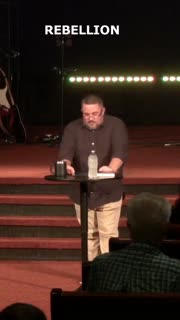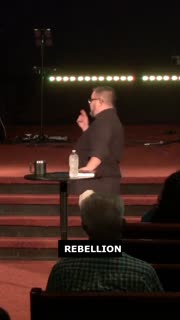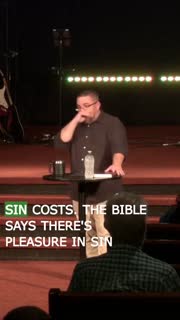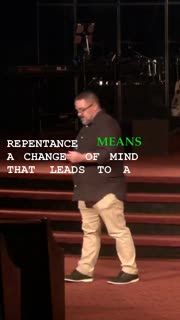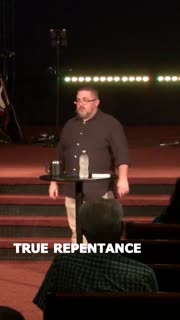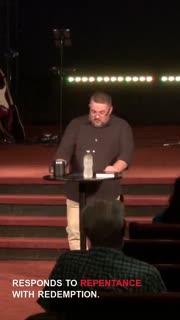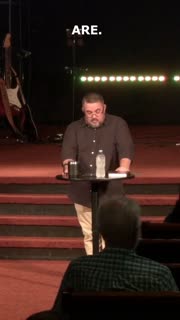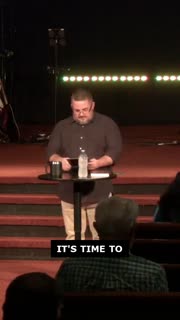Breaking the Cycle: Rebellion, Repentance, and Redemption
Summary
### Summary
The book of Judges reveals a recurring cycle of sin and rebellion among the Israelites, a pattern that mirrors our own society today. The timeline of Judges spans from 1350 to 1050 B.C., leading up to the era of King David. The essence of the book is captured in Judges 21:25, which states, "In those days, there was no king in Israel, and everyone did what was right in his own eyes." This verse resonates with our current societal mindset, where subjective truths often overshadow absolute truths found in Jesus Christ.
The four stages of the cycle in Judges are rebellion, rebuke, repentance, and redemption. Rebellion is characterized by consistently not doing what God asks, leading to a state of spiritual and moral decay. The Israelites' failure to fully obey God resulted in their enslavement by the very things they were supposed to destroy. This rebellion is often rooted in arrogance, thinking we can manage on our own after a brief period of obedience.
Rebuke follows rebellion, where God allows consequences to unfold as a form of discipline. Sin has a cost, and ignoring this leads to a distorted sense of right and wrong. True love from God includes discipline, as it aims to correct and guide us back to the right path.
Repentance is the turning point, a heartfelt change of mind that leads to a change in action. It's not merely feeling sorry but making a conscious decision to turn away from sin and towards God. True repentance involves a willingness to leave behind what we were to become what God intends us to be.
Finally, redemption is God's response to genuine repentance. Despite the Israelites' repeated failures, God continually raised up deliverers to save them. This demonstrates God's unwavering love and willingness to redeem us, no matter how many times we fall.
The cycle of rebellion, rebuke, repentance, and redemption is not just a historical account but a mirror reflecting our own lives. We are called to break this cycle by making a conscious choice to follow God's path, fully committing to His ways rather than our own.
### Key Takeaways
1. Rebellion and Arrogance: Rebellion often starts with small acts of disobedience but quickly escalates into a lifestyle of arrogance, thinking we can manage without God. This arrogance blinds us to the consequences of our actions, leading us further away from God's intended path. [06:57]
2. The Cost of Sin: Sin may offer temporary pleasure, but it comes with a significant cost. Ignoring the consequences of sin leads to a distorted sense of right and wrong, making it crucial to understand that true freedom comes from obedience to God. [18:24]
3. True Repentance: Repentance is more than just feeling sorry; it is a heartfelt decision to change one's mind and actions. True repentance involves a willingness to leave behind old ways and fully embrace the new life God offers. [24:45]
4. God's Discipline: God's rebuke is an act of love, aimed at correcting and guiding us back to the right path. Discipline may be uncomfortable, but it is essential for spiritual growth and aligning our lives with God's will. [20:38]
5. Unwavering Redemption: Despite our repeated failures, God's love remains steadfast. He continually offers redemption, raising up deliverers to save us and restore us to His intended path. This demonstrates His unwavering commitment to our spiritual well-being. [28:40]
### YouTube Chapters
[0:00] - Welcome
[01:15] - Introduction to the Book of Judges
[02:29] - The Problem of Subjective Truth
[03:28] - The Cycle of Rebellion
[05:12] - Defining Rebellion
[06:57] - Consequences of Partial Obedience
[09:08] - The Arrogance of Self-Reliance
[10:55] - The Allure of Baal and Ashtoreth
[12:59] - Modern Parallels to Ancient Idolatry
[14:21] - The Search for Hope
[16:47] - The Enslavement of Rebellion
[17:45] - The Cost of Sin
[20:38] - The Necessity of Discipline
[23:21] - The Power of Repentance
[24:45] - True Repentance Defined
[28:40] - God's Redemption
[30:39] - The Cycle of Judges
[33:12] - Making a Choice
[35:15] - A Call to Commitment
[36:20] - Conclusion and Worship
Study Guide
### Bible Study Discussion Guide
#### Bible Reading
1. Judges 21:25 - "In those days, there was no king in Israel, and everyone did what was right in his own eyes."
2. Judges 2:1-5 - The Angel of the Lord's rebuke to Israel.
3. Judges 3:9 - "But when the people of Israel cried out to the Lord, the Lord raised up a deliverer for the people of Israel, who saved them, Othniel the son of Kenaz, Caleb's younger brother."
#### Observation Questions
1. What does Judges 21:25 reveal about the state of Israel during the time of the Judges? How does this compare to our society today? [01:15]
2. According to Judges 2:1-5, what were the Israelites supposed to do with the altars of the inhabitants of the land, and what was the consequence of their disobedience? [06:00]
3. In Judges 3:9, what was God's response when the Israelites cried out to Him? How quickly did God act to deliver them? [24:17]
4. What are the four stages of the cycle described in the book of Judges? How do these stages manifest in the lives of the Israelites? [03:28]
#### Interpretation Questions
1. How does the cycle of rebellion, rebuke, repentance, and redemption in Judges reflect the spiritual journey of believers today? [30:39]
2. What does the repeated failure of the Israelites to fully obey God teach us about partial obedience and its consequences? [06:57]
3. How does God's discipline, as described in Judges 2:14-15 and Hebrews 12:6, demonstrate His love for us? Why is discipline necessary for spiritual growth? [20:38]
4. What does true repentance involve according to the sermon, and how does it differ from merely feeling sorry for one's actions? [24:45]
#### Application Questions
1. Reflect on a time when you acted in rebellion against God's commands. What were the small acts of disobedience that led to a larger pattern of rebellion? How did you recognize the consequences of your actions? [06:57]
2. Consider the cost of sin in your life. What temporary pleasures have led to long-term consequences? How can you shift your focus to the true freedom that comes from obedience to God? [18:24]
3. Think about an area in your life where you need to practice true repentance. What specific actions will you take to turn away from sin and fully embrace the new life God offers? [24:45]
4. How have you experienced God's discipline in your life? In what ways has it helped you grow spiritually and align your life with God's will? [20:38]
5. Reflect on God's unwavering redemption in your life. Despite your repeated failures, how has God continually offered you deliverance and restoration? [28:40]
6. Identify a current cycle of rebellion, rebuke, repentance, and redemption in your life. What steps can you take to break this cycle and fully commit to following God's path? [33:12]
7. How can you make a conscious choice to serve God in your daily life? What specific changes will you implement to ensure you are following His ways rather than your own? [35:15]
Devotional
Day 1: The Arrogance of Self-Reliance
Rebellion often starts with small acts of disobedience but quickly escalates into a lifestyle of arrogance, thinking we can manage without God. This arrogance blinds us to the consequences of our actions, leading us further away from God's intended path. The Israelites' failure to fully obey God resulted in their enslavement by the very things they were supposed to destroy. This rebellion is often rooted in arrogance, thinking we can manage on our own after a brief period of obedience. We must recognize that our self-reliance is a form of rebellion against God, and it leads to spiritual and moral decay. [06:57]
Jeremiah 17:5-6 (ESV): "Thus says the Lord: 'Cursed is the man who trusts in man and makes flesh his strength, whose heart turns away from the Lord. He is like a shrub in the desert, and shall not see any good come. He shall dwell in the parched places of the wilderness, in an uninhabited salt land.'"
Reflection: In what areas of your life are you relying on your own strength instead of trusting in God? How can you begin to surrender these areas to Him today?
Day 2: The Cost of Sin
Sin may offer temporary pleasure, but it comes with a significant cost. Ignoring the consequences of sin leads to a distorted sense of right and wrong, making it crucial to understand that true freedom comes from obedience to God. The Israelites' repeated failures and subsequent enslavement highlight the heavy price of sin. We often underestimate the cost of our disobedience, thinking we can escape the consequences. However, true freedom and peace are found in aligning our lives with God's will. [18:24]
James 1:14-15 (ESV): "But each person is tempted when he is lured and enticed by his own desire. Then desire when it has conceived gives birth to sin, and sin when it is fully grown brings forth death."
Reflection: What is one sin in your life that you have been ignoring or downplaying? How can you confront it and seek God's help to overcome it?
Day 3: True Repentance
Repentance is more than just feeling sorry; it is a heartfelt decision to change one's mind and actions. True repentance involves a willingness to leave behind old ways and fully embrace the new life God offers. It's not merely feeling sorry but making a conscious decision to turn away from sin and towards God. True repentance involves a willingness to leave behind what we were to become what God intends us to be. [24:45]
Joel 2:12-13 (ESV): "'Yet even now,' declares the Lord, 'return to me with all your heart, with fasting, with weeping, and with mourning; and rend your hearts and not your garments.' Return to the Lord your God, for he is gracious and merciful, slow to anger, and abounding in steadfast love; and he relents over disaster."
Reflection: Is there an area in your life where you need to truly repent? What steps can you take today to turn away from that sin and towards God?
Day 4: God's Discipline
God's rebuke is an act of love, aimed at correcting and guiding us back to the right path. Discipline may be uncomfortable, but it is essential for spiritual growth and aligning our lives with God's will. The Israelites experienced God's discipline as a form of love, intended to bring them back to Him. We must understand that God's discipline is not punitive but redemptive, designed to correct and guide us. Embracing God's discipline helps us grow spiritually and align our lives with His will. [20:38]
Hebrews 12:5-6 (ESV): "And have you forgotten the exhortation that addresses you as sons? 'My son, do not regard lightly the discipline of the Lord, nor be weary when reproved by him. For the Lord disciplines the one he loves, and chastises every son whom he receives.'"
Reflection: How have you experienced God's discipline in your life? How can you embrace it as an act of His love and allow it to guide you back to the right path?
Day 5: Unwavering Redemption
Despite our repeated failures, God's love remains steadfast. He continually offers redemption, raising up deliverers to save us and restore us to His intended path. This demonstrates His unwavering commitment to our spiritual well-being. The cycle of rebellion, rebuke, repentance, and redemption is not just a historical account but a mirror reflecting our own lives. We are called to break this cycle by making a conscious choice to follow God's path, fully committing to His ways rather than our own. [28:40]
Isaiah 44:22 (ESV): "I have blotted out your transgressions like a cloud and your sins like mist; return to me, for I have redeemed you."
Reflection: In what ways have you experienced God's redemption in your life? How can you share this experience with others to encourage them in their faith journey?
Quotes
1. "You don't have a truth. You have an experience. You have what you have gone through, but the only person that holds any truth is Jesus Christ. Okay? This book right here is the standard. Okay? So, we're at that place, at least in my humble, but as Pastor Chris would say, correct, opinion, that we are at that place in our nation and around our world that people are doing what they want to do." [02:29] (39 seconds)
2. "What you refuse to destroy will eventually destroy you. Come on. Come We want to serve God. To deal. So God will deal with the consequences of our actions, but we don't want to serve God enough to change what got us there in the first place. We just want to keep circling that mountain and coming back and go, God, set me free again. God, set me free again. God, pay that bill again. God, pay that bill again." [06:00] (38 seconds)
3. "Rebellion is birthed in arrogance. Thanks for getting me here. Now I've got it. Right. Here's the fact. I can. Say I'm deciding I'm going to go to the East Coast. And so we look up the directions to the East Coast and it tells me we're going to go on up here and we're going to get on 40 East. But I decide somewhere between here and where is it?" [08:21] (33 seconds)
4. "Rebellion starts slow, but it enslaves fast. Man, the children of Israel going into Egypt, all they could think about was we had no food here. Now they're feeding us. And before they know it, man, they're eating, they're comfortable, they have homes, they have health care, they have everything. They need, but it costs them every bit of their life and their freedom as they serve the very thing that once fed them." [16:47] (38 seconds)
5. "Sin costs. The Bible says there's pleasure in sin for a season. We focus on the pleasure and we forget about the season. Because there comes a point when the season's over and the very thing that sin is going to cost you steps up for payment. I got this note. It said if we never pay for sin or wrong, then right and wrong are simply illusions." [18:24] (42 seconds)
6. "Repentance means a change of mind that leads to a change of action. We have so misused that word in church culture in our day because repentance is basically turned into, Oh, God, I'm sorry. Repentance is not, Oh, God, I'm sorry. Repentance is a change of mind that leads to a change of action. Repentance is a change of mind that leads to a change of action. I turn and walk away from what I was doing when I realize it is opposite of what God has required." [24:45] (42 seconds)
7. "True repentance is falling so in love with who God's called you to be. That you're willing to risk the discomfort of putting what you were to the side to pursue what He's called you to be. Takeaway for this section is repentance is a heart decision. Listen, is not a head decision. Everything starts in your head, right? I get that. But ultimately, it's not a head decision. You've got to be sold into that decision." [26:17] (42 seconds)
8. "God responds to repentance with redemption. Judges 3.9. When the people of Israel cried out to the Lord, the Lord raised up a deliverer for the people of Israel who saved them, Othniel of Canaz, Caleb's younger brother. So, God gave them a deliverer. He says of Othniel in Judges 3.10, the Spirit of the Lord was on him." [28:40] (20 seconds)
9. "God loves us where we are. But He loves us too much to leave us there. And the fact is, man, God, by His Holy Spirit, is consistently calling out to us over and over and over. In the midst of our rebellion, He is drawing us consistently. Man, I remember when I had walked away from the Lord back in my teenage years. Man, I'd walked away from the Lord. I was doing everything that I knew I should. I couldn't do because I was running hard from God." [30:39] (43 seconds)
10. "It's time to make a choice. It's time that we choose who we're going to serve. And if we choose to serve God, that means that we're choosing to obey Him. Choosing to do what He asks. Come on. Are you there? Now, I'm not telling you what He's asking you. I'm just asking you the purpose of this whole series to get His people in. His book. You let His words speak to you. By His Spirit, He will let you know." [34:33] (48 seconds)
